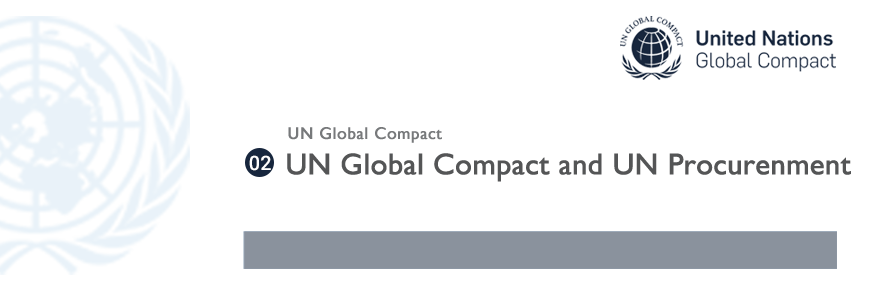
The Code of Conduct sets forth what is expected of all suppliers with whom the UN does business.”
This includes:
Human Rights
1. Support and respect the protection of internationally proclaimed human rights.
2. The UN expects its suppliers to create and maintainan environment that treats all employees with dignity and respect which are free of any threats of violence,sexual exploitation or abuse, verbal or psychological arassment or abuse.
3. Non-engagement in the sale or manufacture ofanti-personnel mines or components utilized in the manufacture of anti-personnel mines.
4. UN expects its suppliers to follow all relevant legislation,regulations and directives in country in which theyoperate to ensure a safe and healthy workplace.
Labour
5. Prohibition of forced, bonded or indentured labor or involuntary prison labour.
6. Non-engagement in any practice inconsistent with the rights set forth in the Convention on the Rights of the Child or the ILO Minimum Age Convention.
7. Recognition and respect for the rights of employees to freely associate, organize and bargain collectively in accordance with the laws of the countries in which theyare employed.
8. Zero tolerance for any form of discrimination in hiring and employment practices.
9. Compliance with all applicable working hourrequirements as established by local law.
10. The UN expects its suppliers to comply, at a minimum,with all wage and hour laws and regulations, including those ertaining to minimum wages, overtime wages,piece rates, other elements of compensation and to provide legally mandated benefits.
11. Suppliers must follow all relevant legislation, regulations and directives in country in which they operate to ensure a safe and healthy workplace.
Environment
12. Suppliers must have an effective environmental policy.
13. Chemical and other materials posing a hazard to the environment are to be identified and managed to ensure their safe handling, movement, storage, recycling or reuse and disposal.
14. Wastewater and solid waste generated from operations,industrial processes and sanitation facilities are to be monitored, controlled and treated as required prior to discharge or disposal.
15. Potentially dangerous air emissions are to be characterized, monitored, controlled and treated as required prior to discharge.
16. Waste of all types, including water and energy, are to be reduced or eliminated at the source.
Bribery and Corruption
17. The UN expects its suppliers to adhere to the highest standard of moral and ethical conduct, to respect local laws and not engage in any form of corrupt practices,including extortion, fraud, or bribery.
18. Disclosure to the UN any situation that may appear as a conflict of interest, and disclose to the UN if any UN official or professional under contract with the Organization may have an interest of any kind in the supplier’s business or any kind of economic ties with the supplier.
19. The UN has a “zero tolerance” policy and does not accept any type of gift or any offer of hospitality. The UN also expects its suppliers not to offer any benefit to any UN staff member to facilitate business.
20. Post-employment restrictions apply to UN former staff members and to staff in service who participated in the procurement process, as well as to UN suppliers.